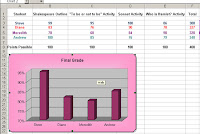 This post is probably going to seem a little disjointed, but if there's anything that I'd like any reader to take away from it, it's the very last two sentences.
This post is probably going to seem a little disjointed, but if there's anything that I'd like any reader to take away from it, it's the very last two sentences.If you’re like the vast majority of the households in America, then one spouse "handles the money" and keeps the other spouse informed of what's going on. This information exchange varies from couple to couple to a wide degree, all the way from almost managing the money together to one spouse not knowing what's going on at all.
I like to think that MLB and I are right in the middle of that group. As you can probably guess, I have a pretty firm (and detailed) handle on our money, managing all aspects of our financial lives. I make sure that every penny is given a job when it comes in, and is tracked when it goes out. MLB certainly doesn't care for doing it and I'm a bit of a money-psycho, so it works well for us.
That said, MLB and I sat down and had our monthly budget meeting tonight. Basically, every month, we sit down together and go over the past month's expenditures and income, and establish the next month's budget.
I'm the biggest nerd at the homestead (okay, the only nerd), so I'm also the main finance guy, or the CFO of the household, as MLB calls it, and I prepare all the statements of expenditures and incomes. I also lay out the upcoming month's preliminary budget, based on the past month's income. We go over the preliminary budget I've created for the next month, and we discuss and make any changes that are necessary. We also discuss any issues we came across over the last month: where we’ve overspent, where we can cut back, and how we can do better. We also talk about any upcoming financial hurdles and how we're doing in working toward the financial goals we've set for the year.
It sounds really detailed and complicated, but since I already track everything, and most information is automatically generated by my spreadsheets, it's really not too bad. MLB gets thoroughly briefed in everything and has veto/approval power over absolutely every aspect of our finances, so it's completely a 50/50 agreement. By the end of the meeting, we're both very clear about where we stand, where we're going, and how we're going to get there.
I know that we're probably a bit unusual in this regard (okay, I'm unusual), but there is no doubt in my mind that our management method works, and works well. We're never surprised by a bill (more on why in the next few days), never seem to come up short, and have been able to put more and more money into investments and savings.
Now, I'll be the first to admit that MLB isn't exactly excited and enthusiastic about the meetings, mostly because she is not a numbers person and she trusts me to get things done right. Let's face it, budgeting is not sexy. But, I know that she's appreciative of the all care that is taken, and is confident that I'm managing our money well. And, I firmly believe that it is absolutely critical that she understand our situation financially. Full disclosure is the only policy.
Finally, and most importantly, maintaining and going over our budget every month gives us each financial peace of mind like you wouldn't believe. And, since more marriages dissolve over money issues than anything else, that is completely critical to our relationship.
Budgeting and sleeping well at night because of it,
YFNN











